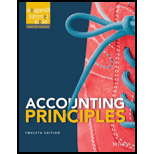
Concept explainers
(a)
Perpetual Inventory System: Perpetual Inventory System refers to the inventory system that maintains the detailed records of every inventory transactions related to purchases and sales on a continuous basis. It shows the exact on-hand-inventory at any point of time.
Inventory cost flow: It refers to the flow (movement) of inventory when it is purchased or sell by the business organization.
The various inventory cost flow methods are:
- First-in, first-out (FIFO)
- Last in, first-out (LIFO)
- Average-cost
FIFO method: In FIFO method, those goods are sold first which are purchased first by the business organization.
LIFO method: In LIFO method, those goods are sold first which are purchased in last by the business organization
Average-cost method: In average-cost method, the value of inventory is calculated by the average of cost of goods sold which are available for the sale purpose for that period.
To determine: Prepare inventory schedule under perpetual system by FIFO method.
(b)
Prepare inventory schedule under perpetual system by LIFO method.
(c)
Prepare inventory schedule under perpetual system by moving-average cost.
Want to see the full answer?
Check out a sample textbook solution
Chapter 6 Solutions
Accounting Principles - Standalone book
- What is the purpose of depreciation in accounting? A) To allocate the cost of a long-term asset over its useful lifeB) To decrease the value of a company's liabilitiesC) To record income from the sale of an assetD) To allocate the cost of inventory purchasesneedarrow_forwardWhat is the purpose of depreciation in accounting? A) To allocate the cost of a long-term asset over its useful lifeB) To decrease the value of a company's liabilitiesC) To record income from the sale of an assetD) To allocate the cost of inventory purchasesarrow_forwardWhich of the following is a current asset? A) LandB) BuildingsC) Accounts receivableD) EquipmentCorrarrow_forward
- Which of the following is a current asset? A) LandB) BuildingsC) Accounts receivableD) Equipment needarrow_forwardWhich of the following is a current asset? A) LandB) BuildingsC) Accounts receivableD) Equipmentarrow_forwardWhich accounting principle requires that expenses be recorded when incurred, regardless of when cash is paid? A) Matching principleB) Revenue recognition principleC) Cost principleD) Going concern principleNo aiarrow_forward
- Which accounting principle requires that expenses be recorded when incurred, regardless of when cash is paid? A) Matching principleB) Revenue recognition principleC) Cost principleD) Going concern principlearrow_forwardWhich of the following statements is true about a balance sheet? A) It shows the financial performance of a company over a specific period of timeB) It includes revenue and expensesC) It lists assets, liabilities, and equityD) It is prepared only at the end of the yearcorarrow_forwardWhich of the following statements is true about a balance sheet? A) It shows the financial performance of a company over a specific period of timeB) It includes revenue and expensesC) It lists assets, liabilities, and equityD) It is prepared only at the end of the year need nelparrow_forward
- Which of the following statements is true about a balance sheet? A) It shows the financial performance of a company over a specific period of timeB) It includes revenue and expensesC) It lists assets, liabilities, and equityD) It is prepared only at the end of the yeararrow_forwardThe normal balance of an asset account is: A) DebitB) CreditC) None of the aboveD) Both debit and credit correct answerarrow_forwardThe normal balance of an asset account is: A) DebitB) CreditC) None of the aboveD) Both debit and creditarrow_forward

 AccountingAccountingISBN:9781337272094Author:WARREN, Carl S., Reeve, James M., Duchac, Jonathan E.Publisher:Cengage Learning,
AccountingAccountingISBN:9781337272094Author:WARREN, Carl S., Reeve, James M., Duchac, Jonathan E.Publisher:Cengage Learning, Accounting Information SystemsAccountingISBN:9781337619202Author:Hall, James A.Publisher:Cengage Learning,
Accounting Information SystemsAccountingISBN:9781337619202Author:Hall, James A.Publisher:Cengage Learning, Horngren's Cost Accounting: A Managerial Emphasis...AccountingISBN:9780134475585Author:Srikant M. Datar, Madhav V. RajanPublisher:PEARSON
Horngren's Cost Accounting: A Managerial Emphasis...AccountingISBN:9780134475585Author:Srikant M. Datar, Madhav V. RajanPublisher:PEARSON Intermediate AccountingAccountingISBN:9781259722660Author:J. David Spiceland, Mark W. Nelson, Wayne M ThomasPublisher:McGraw-Hill Education
Intermediate AccountingAccountingISBN:9781259722660Author:J. David Spiceland, Mark W. Nelson, Wayne M ThomasPublisher:McGraw-Hill Education Financial and Managerial AccountingAccountingISBN:9781259726705Author:John J Wild, Ken W. Shaw, Barbara Chiappetta Fundamental Accounting PrinciplesPublisher:McGraw-Hill Education
Financial and Managerial AccountingAccountingISBN:9781259726705Author:John J Wild, Ken W. Shaw, Barbara Chiappetta Fundamental Accounting PrinciplesPublisher:McGraw-Hill Education





